- Thursday, 2 October 2025
TMJ Rhododendron Capital of Nepal
Rhododendron is Nepal's officially declared national flower. The areas of Tinjure, Milke and Jaljale, popularly known as TMJ, are the 'rhododendron capital' of Nepal. The blooming of rhododendron means blooming in Nepal. TMJ is the place where Nepal blooms. TMJ's rhododendron capital status was awarded owing to its availability of 28 out of 32 species of rhododendron found in Nepal. These statistics were compiled by IUCN in 2010.
Global Paper Crisis: Impact On Nepal
What do we need to start our day? A nice cup of coffee and a morning newspaper, right? How can we forget pieces of paper on which we have set our work plans for the day? We cannot even think of forgetting our beautiful novels and storybooks that we read before bed and many other things made out of the paper we use every day. Maybe, all these things must have reminded you of the significance of the paper and paper-made products in our life.
When Will We Learn?
Learning is an active process of acquiring knowledge, skill, and attitude based on prior experiences. We did not have prior experience with the covid-19 pandemic therefore during the first wave of covid, everyone is in a state of confusion. Neither citizens nor the state was prepared for such a huge-scale crisis. Fortunately, we survived three waves with some economic consequences and some lives. As a rule of thumb, we have to learn from this expensive experience. However, it seems that we have yet to learn many things. The health system was on the verge of collapse. People were not dying due to a lack of expensive medicines like in other major diseases, rather they were forced to die owing to the lack of oxygen. They died because hospitals were either overly occupied or refusing to admit them.
A Recipe For Internal Party Reform
Ballav DahalBeing the key institution of democracy, political parties offer citizens a choice to govern by competing in elections. Parties contribute to inducting and integrating people into the democratic political system. They are prime actors in democratic societies that alone can play vital roles in promoting public accountability. The political parties that have fully adopted internal democracy can carry out their responsibilities in an effective manner. Bearing this view, the Constitution of Nepal, 2015 has a provision for political parties to fully remain democratic internally to promote the principles and values of democracy. The national charter requires them to hold internal elections at least once every five years. As per the constitution, political parties should run more democratically and openly, encouraging more party members at the provincial and local levels to exercise a higher amount of decision-making authority. We see that even when the country has gone for a federal system of governance, the institutional practices of parties remain mostly centralised. This practice was evident in their recent decisions on the selection of mayoral and deputy mayoral candidates for metropolises and sub-metropolises. This publication includes a total of 13 articles focussing on the main theme of internal party democracy. Youth leadership, gender, resources of national parties, Nepali women's struggles and challenges, among others, are also dealt with. While NDI has brought out such a worthwhile publication with the support of USAID, international and Nepali parliamentarians and experts have contributed their quite comprehensive write-ups for it. It is worth mentioning that most of the writers are women with distinct recognition and identity. The booklet highlights some valid concerns from a Nepali and international perspective. Reforms in electoral systems within political parties, issues of women and marginalised communities in parties, training and education processes in parties, and experiences of international practitioners relevant to Nepal are some of such concerns.The publication hints at how internal party reform can help prevent political parties from deviating from democratic practices and how the involvement of youths in political parties is vital for parties to be electorally successful. This provides a lot of insights into how shifting party resources from the centre to the local level could help build up a more active membership base; how the principle of internal party democracy can be revived for the benefit of all party members; and how the introduction of varied internal party reform instruments can help increase participation and representation of women, youths and varied marginalised communities are other topics included in it. As stated by Deborah Healy, Senior Country Director at NDI Nepal, these thought-provoking articles could kindle conversations on how the political parties in Nepal can internally reflect on their structures to help broaden their electoral appeal.In her article ‘Be A Junkiri- Not An Animated Dream', Birgitta Ohisson, NDI's Director of Political Party Programmes, writes: "As half of the population of Nepal is under the age of 25, the country's political landscape desperately needs to change." Ohisson, also a former Swedish Minister for European Affairs, urges political parties to attract young people in general and young women in particular. She calls on every political party to be a firefly symbolising hope, empowerment and inspiration. Similarly, Arta Dade, an Albanian parliamentarian, in her write-up titled ‘Safeguards For International Party Democracy’, calls for drastic reforms within parties. According to her, the more internally democratic political parties are, the more democratic society will become to respond to people's expectations.In her piece ‘Youth Leadership In Political Parties’, Anupa Shrestha underlines the need for political parties to motivate greater youth involvement in politics and provide them with leadership opportunities. Binu Subedi, in her article ‘Internal Democracy In Political Parties’, calls on parties to follow the principles of inclusion, social justice and equality as demanded by women and other marginalised communities. She shows her concern over the apathy on the part of political parties to consolidate democratic values within their structures. She says even the parties that have fought for democracy have been found only linking democracy with periodic elections and citizens’ suffrage. Likewise, Corien Jonker, in her piece ‘Internal Party Reform: The Importance of Gender Equality, suggests implementing the constitutional provisions regarding gender to bridge the gender gap in Nepal. Presenting a Moldovan case study, Corien, a former member of the Dutch parliament, shows how the formulation and enactment of gender action plans had contributed to strengthening and formalising the commitment of political parties to advance gender equality and provide a baseline for progress. In her write-up ‘Democracy and Governance within Political Parties', Dolma Tamang, a member of the Nepal Women's Association of Nepali Congress, suggested that every policy decision should be conducted in a democratic and institutional manner as specified by the statutes and rules of political parties to make tangible inward reforms. Johan Hamels has drawn the party leadership's attention toward transferring resources from the centre to local councillors. The political parties in the country could find the ideas forwarded by all the writers to be worthwhile for promoting democracy within them. Thus, the publication could prove to be a recipe for them to change.
Summer Juice
Summer means the celebration of delicious juicy fruits. Again, summer means rotating the sun's rays all day long. During this season, the intensity of heat increases in nature. Due to this extreme heat, excessive sweating from the body occurs. It results the in dehydration in the body. For this reason, it is necessary to drink enough water at this time. Otherwise, the body becomes dehydrated and the risk of heat stroke increases.
Economy set to grow by 5.8 per cent
The Central Bureau of Statistics (CBS) has estimated that the economy will grow by 5.84 per cent at consumer price in the current fiscal year 2021/22. At basic price, the growth would be 5.49 per cent. The statistical body under the National Planning Commission (NPC) has made the projections on the basis of the calculation of nine months real statistics and three months estimated economic activities.
I work in favour of junior officers: IGP Thapa
Inspector General of Nepal Police (IGP) Shailesh Thapa Kshetri has said that unprecedented works were done in favour of lower level police personnel during his tenure. Speaking at a press conference at the Police Headquarters, Naxal on Wednesday, Inspector General Thapa, who is retiring on May 2 after completing 30 years in service, said, "Every IGP used to be accused of focusing and giving more attention to the promotion of senior police officers, but throughout my tenure, I have tried to clear this misconception by promoting thousands of junior police personnel at one time.”
Online form to report use of children in elections launched
National Child Rights Council (NCRC) has developed online Google form to immediately report about the use of children in elections by violating the code of conduct. Organising an interaction programme titled ‘Child rights monitoring in local election -2022: justification and priority’ by NCRC on Wednesday, the Council asked civil society, child rights activists and election observers to register complaint through online Google form if they find child rights violation in the election campaign. The apex child rights body NCRC has asked poll authorities to prohibit the use of children in the election campaign in any form, taking serious view of minors being engaged in various activities such as sloganeering and circulation of pamphlets by violating their rights.
Prices of egg, meat shoot up by up to 70% in Humla
The prices of meat and eggs have skyrocketed in Humla, a mountainous district not connected to road transport. That is because meat and eggs stopped being transported by aircraft and now have to be transported by helicopter. Gorkha Bohara, a consumer, said that the price of an egg has gone up from Rs. 18 to Rs. 30.
FNCCI, NTB to join hands for tourism promotion
A memorandum of understanding has been signed between the Federation of Nepalese Chambers of Commerce and Industry (FNCCI) and the Nepal Tourism Board (NTB) with the objective of cooperating for the promotion of tourism in the country. The two organisations will cooperate for the promotion and development of the tourism industry, according to a press statement of the FNCCI. FNCCI President Shekhar Golchha and Chief Executive Officer of NTB Dr. Dhananjay Regmi signed the MoU from their respective institutions at the FNCCI secretariat on Thursday. The Tourism Development Committee of the Federation had played a special role to cooperate between two organisations for the promotion of the tourism industry.
Dry Season Power Crunch
Once there was a time when Nepali people were facing a crippling power outage of up to 16 hours a day during the dry season. The load-shedding that affected both the household and industry sector for a decade became a history from the year 2016 when a professional management team at the Nepal Electricity Authority did a miracle in power supply management. The dedicated management team upgraded the country from the age of darkness to light through internal power management, reduction in leakage and notable improvement in power supply system. The increased power import by NEA from India, mostly during the dry season, was also one of the important complements for ending the regular power outages in the country.
Local Bodies Need Capacity Building
To adapt to Nepal's newly created federal structure, the country's local development policy-making process has undergone a makeover. With the adoption of new constitution in 2015, Nepal attempted to address three major issues that had been obstructing the country's progress for millennia. The first issue is the centuries-old centralised bureaucracy. This situation needs to be reformed in conformity with the subsidiarity principle. The country's socio-economic structure is the country's second perennial issue. In the guise of caste and ethnicity, the current social systems were discovered to be causing severe divides among societies.
Fighting Corruption Through Cartoons
With the local poll campaign gripping the country, the Cartoonists’ Club of Nepal recently organised an exhibition entitled ‘Nisana’ (target) to expose the cases of corruption and discrepancies besetting the nation. There is no dearth of commitment on the part of the parties and the candidates to eradicate corruption from the society. Hence, the show is expected to play an important role in spreading awareness against corruption during the election, a crucial moment to pick the people’s representatives for the public offices.
Secret Of Longevity
The world’s oldest person recently passed away at the age of 119. Kane Tanaka was a Japanese national, who died of old age in a hospital in Fukuoka city. Being a citizen of a country where the average life expectancy is 70 years, I get really surprised and curious when I read about such individuals. What could be the secret of a long life exactly? Tanaka is a representative of many Japanese people who enjoy a long life. Japan ranks the second in the globe for life expectancy and the average Japanese citizen lives to 85 years. The life expectancy for Japanese women is 88.1 years. Research has pointed out food to be a major contributor to all of this. Japanese meals are pesticide-free and organic. Also, the meal only has a little portion of red meat and sugar, prioritising more fish and seafood.
Trailer of Life in LA released
Trailer of the film Life in LA, which is scheduled to be released on May 20, was made public in the capital on Wednesday. The 2-minute-55 second trailer show includes the ups and downs in the love life of lead actors of the film Bash Bissu, Aakesha Bista and Shilpa Maskey. It deals with the lifestyle of Nepalis living abroad. Artistes like Gaurav Pahari, Buddhi Tamang, Prakash Ghimire, Lokendra Lekhak, Jared Billups, Jayandra Chiluwal, Uttam Jung Thapa and Aayush KC are also seen in the triangular love story genera film. The film, directed by Surya N. Shrestha, has music by Alish Karki and Pratick Poudel. Singers Pratap Das and Prabisha Adhikari have lent their voice in the songs. The film produced by Bash Entertainment, is produced by Bash Bissu.


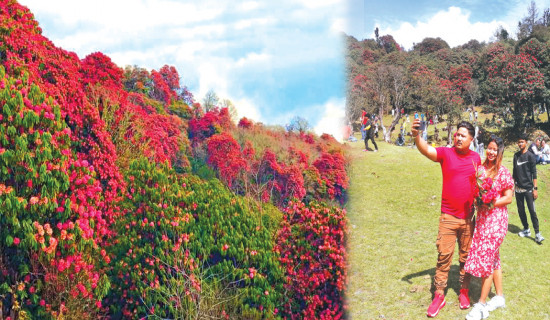


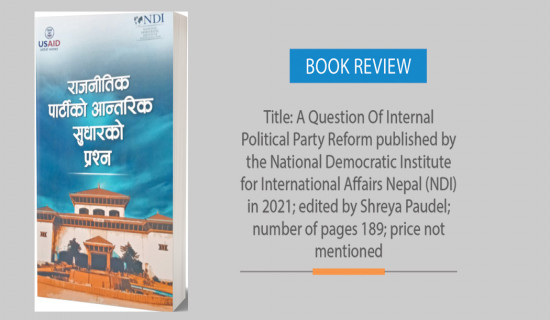

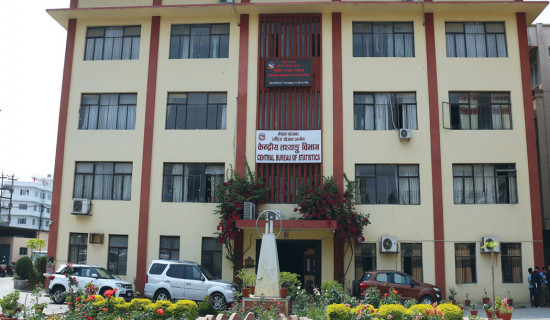


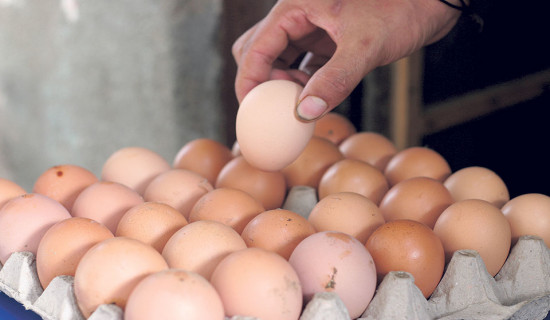


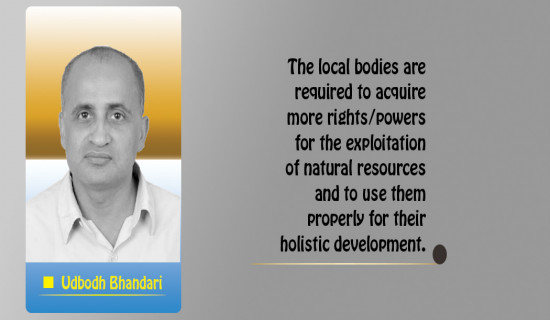
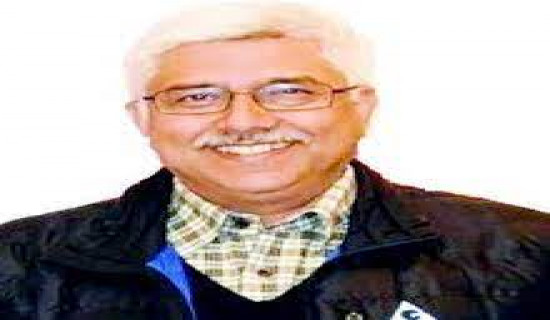

.jpg)